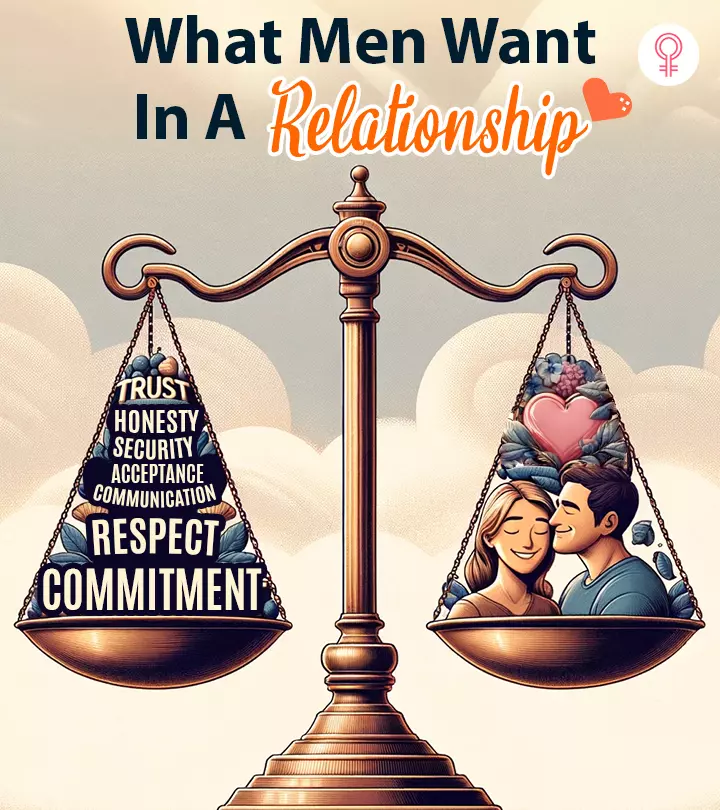How To Build An Interdependent Relationship With Your Partner
Shift away from codependancy and make your relationship a safe space where you two can tango!

Image: Shutterstock
Interdependence in a relationship is all about striking the right healthy balance between yourself and a partner within that relationship. For instance, you are a party animal, but your partner prefers to read books at home. You love cooking while your spouse does other household chores. These differences do not develop into a problem when you have a healthy interdependent relationship. Your partner will not have any issue if you party with friends, and they will be happy to take up the household chores while you handle the cooking.
An interdependent relationship brings more personal space, comfort, and understanding. If you understand the other person’s likes and dislikes, there will be fewer fights, complaints, disagreements, and disappointments. Here, we discuss what interdependence in a relationship entails and how to develop it for a happy and wonderful relationship. Scroll down.
In This Article
What Is Interdependence?
Mutual dependence is better known as interdependence. Interdependence refers to two people who are not emotionally dependent on each other. It is a balanced relationship that gives equal importance to both partners. There is stability and cooperation. Each person is independent as well as thinks of the other’s needs and desires and easily puts themselves in their partner’s shoes to see situations from their perspective.
Interdependence includes an understanding of your partner’s physical and emotional needs, and there is a mutual respect in all aspects. There is an appreciation for the other’s presence without a feeling of addiction or obsessiveness. This makes the relationship strong and dynamic. Interdependent relationships allow room for growth and change for both parties without feeling threatened. It is about self-love as well as love for their partner.
An interdependent relationship feels secure when two people find each other with complementary communication skills we learn from our parents and guardians and have learned to positively develop. This relationship allows for a mutually agreed space to support and encourage each other to follow our own personal dreams and goals. But, it is not as simple as it seems. It usually is a connection between two strong individuals and takes some amount of compromise and work to reach an equilibrium.
Let’s understand why interdependence is healthy in a relationship.
Why Is Interdependence Healthy In A Relationship?
An interdependent relationship is probably the healthiest form of a relationship. It is characterized by mutual support, open communication, and personal space (1). These qualities are imperative for any relationship to survive the test of time. An understanding of what your partner wants and not forcing your likes and dislikes on them reduces the chances of disagreements. It is built on maturity and does not require one person to sacrifice anything to make the other one happy. Thus, interdependence allows peace, happiness, and comfort in the relationship, making it mentally, emotionally, and physically healthy.
Check out the next section to learn how to build a healthy interdependent relationship.
How To Build An Interdependent Relationship With Your Partner
To build an interdependence in a relationship, you need to foster a few things in it:
1. Balance: Interdependence allows a person to keep their identity while being with someone they love. It requires no sacrifices, and nothing is done beyond reasonable limits. A person loves themselves and maintains their own life as much as they dive into the relationship and keep each other happy. It is important to maintain this perfect balance where one does not put the partner above themselves but treats them as an equal.
 Quick Tip
Quick Tip2. Individual Identity: A sure way of ensuring that your relationship is on the path to interdependence is not to lose your personal identity while being a couple. Couples’ experts point out the importance of allowing space and independence to grow outside of the marriage or relationship. Expressing one’s opinions while being sensitive to your partner is where interdependence steps in.
Maintaining your identity does not mean that you totally disregard your partner’s likes and dislikes. It means finding a way to respect each other’s values, needs, and habits. You can maintain your identity through work, friendships, or hobbies that you engage in independently. To stay connected to your partner, balance your independence with spending quality time together on activities you both enjoy.
3. Effort: An interdependent relationship requires time, effort, and nurturing. It includes awareness of one’s own needs first to become the best version of yourself and then become the best partner you can be. Relationships require compromise and some amount of sacrifice, but this should not be at the cost of your own dreams and well-being. It takes compassion and effort to achieve interdependence as a couple, and it leads to a healthy and satisfying long-term relationship combined with a mature healthy communication approach during conflict.
4. Communication: To create an interdependent relationship, you both need to be honest and approachable. Both partners must communicate their needs and problems to each other. Engage in active listening and straightforward conversation and avoid blame games. For instance, recognizing and taking responsibility for your own feelings and emotions when your buttons are pressed during conflict towards your partner. Interdependent couples find their way to discuss and clear everything freely, because they want to work on building a stronger foundation together to prevent further misunderstandings.
5. Boundaries: To build an interdependent relationship with your partner, both of you need to set healthy boundaries while you maintain your self-esteem for both of you to be comfortable with or without each other at all times. Boundaries are not about building walls, hiding things from each other, or purposely avoiding each other. It involves transparency in beliefs, values, desires, and limitations and recognizing each other’s strengths and weaknesses. It means drawing the line where you are willing to compromise individually and for your partner you love.
Data drawn from a survey with 2,000 US adult citizens on the significance of delineating personal boundaries within romantic partnerships revealed that a majority (57%) of Americans prioritize personal boundaries and say it is very crucial. On the other hand, 32% consider it only somewhat important.
6. Me Time: Take time out for yourself and do things that your heart desires on your own. In order to keep a relationship interdependent, you do not need to spend every free moment with your spouse. You do not need to cling to each other. Enjoy your solitude and get together when you want to without feeling guilty.
7. Tolerance: Disagreements and friction are common in any relationship when two individuals have different views and personalities. How you then respond and react during your disagreements is what matters. One must learn to be tolerant and compassionate of the other, focus on common goals, and plan new experiences to keep the spark alive to nurture your interdependent bond.
8. Teamwork: Any relationship requires teamwork because it makes the dream work. When you and your partner work together helping each other share your daily chores, picking up the kids, planning your next holiday, putting out the garbage, clearing the dishwasher, particularly when we feel tired, makes us feel more appreciated and loved. Teamwork builds energy, appreciation, and strength in the relationship.
9. Loyalty: Just because you have a certain amount of freedom does not mean you are not answerable to your partner. And it does not mean you are allowed to cheat. Trust has to be earned, and if you have built this together over time, continue to be in your integrity. Be loyal and faithful to your partner and respectful of your interdependent relationship. What you have is a precious gift, so hold on to it!
Often, people end up becoming codependent with their partner because they want to be loved so much or have insecurities they expect their partner to fulfill. They could potentially suffocate or sabotage their relationship. However, such relationships are unhealthy. Learn the differences between interdependence and codependency in the next section.
Interdependence Vs. Codependency
- An interdependent relationship works on mutual support, while a codependent relationship is all about power and control.
- Interdependent relationships are balanced and shared. A codependent relationship is typically imbalanced with one controlling partner and the other a follower.
- Interdependence fosters both the partners’ self-esteem, self-confidence, mutual respect, and emotional security while codependency focuses on only one partner and their happiness leaving one partner unfulfilled and unhappy.
- An interdependent relationship allows an individual to grow and be themselves, but codependence demands change and compromise from one partner.
- Interdependency is healthy, while codependency is a harmful psychological issue when one partner is more dominant and demanding. Remember, you have a choice to leave or get help if you are concerned about your safety.
Scroll down to the next section to learn how to make your relationship less codependent and more interdependent.
Ways To Make Your Relationship Less Codependent And More Interdependent
Codependency is unhealthy and borders on obsession. It is when one partner makes all the sacrifices and does everything to make the other happy. They forget their own needs and happiness, and their world revolves around their partner by choice or not. Interdependency, on the other hand, is a balanced and mutually respectful relationship that is healthy and individually uplifting and happier. These couples are generally healthier psychologically and physiologically, focusing on their self-development and personal well-being. Loving yourself first makes it easier to love and cherish your partner.
Listed below are a few things that you need to engage in to make your relationship more interdependent and less codependent:
- Healthy communication
- Honesty
- Loyalty
- Commitment
- Compromise from both parties
- Cooperation in problem-solving
- Time-out for yourself
- Regular check-ins and discussions about the way things should be for a win/win
- Weekly check-ins and discussions about the way things should be
- Taking breaks
- Establishing healthy boundaries
- Understanding and self-reflection
- Two-way efforts
- Shared new experiences
- Spending time with others who love you
- Learning to say ‘no’
- Engaging and responding
- Clear empowering body language
- Creating a safety net
- Seeing the right relationship expert / or therapist
 Pro Tip
Pro TipInfographic: Warning Signs Of A Codependent Relationship
We all agree that an interdependent relationship is all about a healthy balance between two partners. However, a codependent relationship is characterized as a dysfunctional one. It can harm your self-image, confidence, and mental health as it may put unnecessary pressure on you to sustain this imbalanced relationship. Check out the infographic below to know more about the signs that you are in a codependent relationship.
Interdependence in a relationship is categorized as a healthy balance of mutual dependency on each other. The partners understand each other’s physical and emotional needs and aim to fulfill them while respecting their boundaries. Interdependence does not demand sacrifices beyond a reasonable limit and helps both partners maintain a balance between loving themselves and each other. The individual identity of either partner is not compromised, and there is a free flow of communication, effort, tolerance, loyalty, and teamwork from both sides.
Frequently Asked Questions
What is an example of an interdependent relationship?
The relationship between a parent and a child is an example of an interdependent relationship.
What is emotional interdependence?
Emotional interdependence is where you notice one person’s feelings are related to another person’s feelings.
What is interdependence vs. dependence?
Dependence is one-sided, while interdependence occurs between two or more people or things.
Key Takeaways
- The mutual healthy dependence of both the partners in a relationship is known as interdependence.
- Maintaining personal identity, developing open communication, and embracing mutual support are the bedrock of interdependency.
- When one partner depends on the other partner disproportionately, it can lead to codependency.
Explore the dynamics that make for healthy relationships, where the key to supportive companionship is finding the right balance between codependency and interdependence. Click on this video to learn how to maintain a thriving connection.
References
Articles on StyleCraze are backed by verified information from peer-reviewed and academic research papers, reputed organizations, research institutions, and medical associations to ensure accuracy and relevance. Read our editorial policy to learn more.
- Emotional Interdependence and Well-Being in Close Relationships
https://www.ncbi.nlm.nih.gov/pmc/articles/PMC4786571/
Recommended Articles
- Dos And Don’ts In A New Relationship
- 46 Best Relationship Quotes To Ignite A Fresh Wave Of Love With Your Partner
- The 6 Stages Of A Relationship All Couples Go Through
- How To Spice Up Your Relationship – 15 Romantic Tips
Read full bio of Karen Marshall
Read full bio of Subhrojyoti Mukherjee
Read full bio of Sneha Tete





![warning signs of a codependent relationship [infographic]](https://cdn2.stylecraze.com/wp-content/uploads/2022/08/Warning-Signs-Of-A-Codependent-Relationship-psd-f.jpg.webp)




















